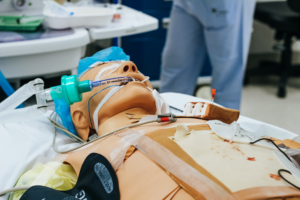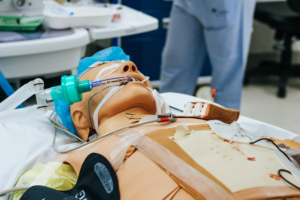

What Is a DNP?
According to the American Association of Colleges of Nursing (AACN), a Doctor of Nursing Practice degree (DNP) is a clinical or practice-oriented doctorate that enables the nurse to expand in both knowledge and skills without a prerequisite intermediary master’s degree. The DNP is designed as an alternative to research-focused doctoral programs, with curricula focused on evidence-based practice, systems leadership, and quality improvement, among other key areas.
Types of DNP Programs
Traditional DNP Programs
The majority of current nurse doctoral students are enrolled in traditional DNP programs that lead to a Doctor of Nursing Practice degree. Traditional DNP programs generally require three years to complete and offer structured pathways for nurses with a master’s degree in nursing (MSN), postgraduate APRN certificate, or another relevant graduate-level nursing program. The traditional DNP program provides an opportunity for nurses interested in clinical practice areas such as community health, public health, education, and administration to complete a DNP degree alongside clinical practice.
RN to DNP Programs
BSN to DNP Programs
A BSN to DNP program is a post-baccalaureate degree program for experienced nurses who want to prepare for an advanced level of nursing practice and clinical research. BSN to DNP curriculum includes both didactics and hands-on practice to enhance knowledge, skill, and clinical decision-making. Coursework is deeply focused on the expanded responsibilities of advanced practice nursing roles, such as systems thinking, evidence-based strategies, health policy, leadership, and informatics.
MSN to DNP Programs
MSN to DNP programs are designed for RNs who have already earned an MSN degree and are looking to expand their knowledge in the field of nursing through scholarly research and clinical practice. MSN to DNP programs are generally structured as accelerated post-graduate degree programs that build upon the MSN degree to provide students with opportunities to specialize in a particular area of advanced practice nursing.
DNP degrees generally require a minimum of 1000 hours of practicum experience, but many MSN to DNP programs will credit students for prior practicum and clinical hours, allowing students to focus on coursework at the doctoral level. These accelerated programs are intended to facilitate the completion of a DNP degree in 18–24 months, which is one-half the time required by traditional programs.
Direct Entry DNP Programs
Direct Entry DNP programs are designed for students with a bachelor’s degree in fields other than nursing, who want to transition directly into an advanced practice clinical nursing degree. Students enrolled in direct-entry DNP programs spend the first year-and-a-half in the program preparing to take the NCLEX-RN examination in order to become registered nurses.
During the second half of the program, students complete courses and clinical fieldwork at the doctorate level in an area of clinical specialization. Direct entry DNP programs are typically designed as full-time, accelerated degree programs and are commonly referred to as pre-licensure DNPs, due to the requirement that students earn their RN licensure prior to beginning doctoral coursework.
Online DNP Programs
Direct Entry DNP programs are designed for students with a bachelor’s degree in fields other than nursing, who want to transition directly into an advanced practice clinical nursing degree. Students enrolled in direct-entry DNP programs spend the first year-and-a-half in the program preparing to take the NCLEX-RN examination in order to become registered nurses.
During the second half of the program, students complete courses and clinical fieldwork at the doctorate level in an area of clinical specialization. Direct entry DNP programs are typically designed as full-time, accelerated degree programs and are commonly referred to as pre-licensure DNPs, due to the requirement that students earn their RN licensure prior to beginning doctoral coursework.
Top DNP Program Specializations
DNP CRNA Programs
Nurse anesthetists are highly specialized registered nurses who provide anesthesia services to surgical patients. They are prepared to assess patient needs, make appropriate anesthetic decisions, and attend to the safety of patients before, during, and after surgery. CRNA programs are offered at MSN and DNP-granting institutions throughout the U.S.
DNP FNP Programs
Family nurse practitioners are healthcare providers who diagnose and treat acute, episodic, or chronic illnesses in patients of all ages. They collaborate with physicians to provide comprehensive, coordinated care for patients throughout their lifetime. FNP programs are unique in that they prepare students for the full spectrum of primary care, including pediatrics, family practice, geriatrics, women’s health, and newborn care.
DNP Midwifery Programs
Certified Nurse-Midwives maintain responsibility for the care of a woman from conception to six weeks postpartum, as well as for prenatal education and counseling. They provide expert advice on birth control options, family planning, pregnancy nutrition, and prenatal testing. They also conduct physical examinations, order and interpret laboratory tests, diagnose conditions, prescribe treatment, and provide patient education.
DNP Psychiatric Nurse Practitioner Programs
Psychiatric nurse practitioners are advanced practice registered nurses who diagnose and treat mental health disorders, provide psychotherapy, and prescribe psychiatric medications. PMHNP programs prepare nurses to work with individuals of all ages who struggle with psychological conditions including anxiety, PTSD, depression, schizophrenia, bipolar disorder, and eating disorders.






